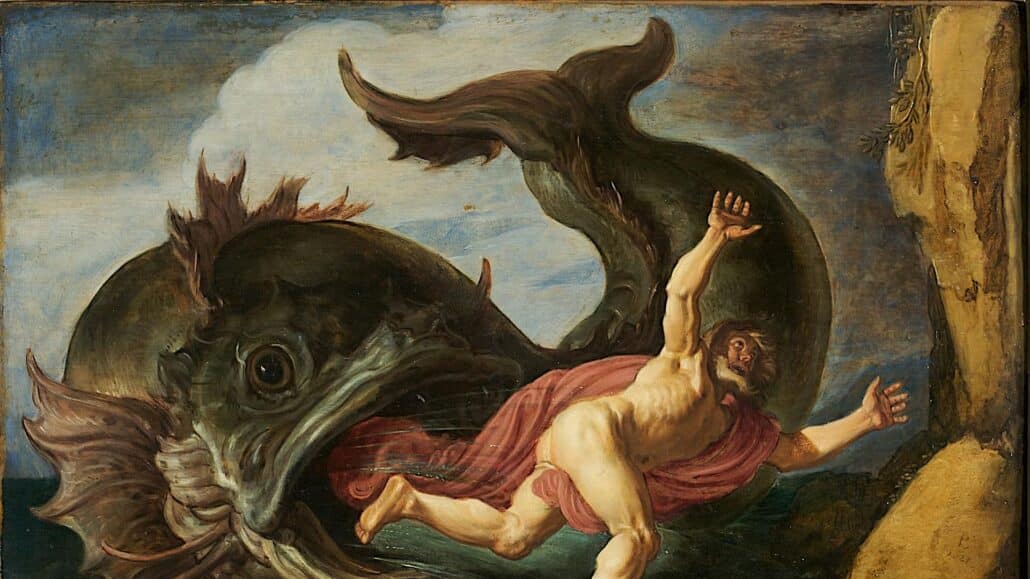One of my favorite features on the television show Sesame Street when I was growing up was a game entitled, “One of These Things Is Not Like the Other.” As the song played in the background, we were challenged to find the one object out of the four that was different: an orange, an apple, a pear and a spoon, for example. Tucked in among the apples-and-oranges books of the prophets in the Hebrew Bible is a spoon!
The prophet Jonah is that oddball piece of Scripture. Written several centuries after the latest of the other prophetic books, this little book is short on prophecy but long on a narrative that satirizes a number of sacred cows and provides genuine insight into what following a call from God really means.
From the opening verses of the Book of Jonah it becomes clear that we’re dealing with an unusual hero. In response to God’s call to head out for the city of Nineveh (located at the center of the Assyrian Empire that encompassed parts of Asia Minor and Mesopotamia) and preach a call for repentance to its inhabitants, Jonah jumps aboard the nearest ship and gets moving—but not to Nineveh. He boards a ship heading for a place called Tarshish. While no one is sure exactly where Tarshish was located, the consensus is that it was somewhere along the southwest coast of Spain, the ends of the earth as far as the ancient Mediterranean world was concerned. According to the scriptural text, Jonah was on the lam, running “away from the Lord” (Jonah 1:3).
Your Assignment, Should You Choose…
It’s not hard for me to sympathize with this reluctant prophet. The Assyrians are notorious in the annals of the ancient Middle East because of their power and the atrocities attributed to them during their conquests. Assyrian stone carvings that have been uncovered in modern times proudly display corpses of defeated soldiers that have been decapitated or otherwise mutilated. In the background the ruins of the conquered city can be seen in flames.
How much of this was a form of propaganda designed to intimidate enemies and how much was based on reality is unknown, but as far as Israel was concerned the legend became a nightmare in 721 B.C. The Assyrian invasion of the Jewish homeland in that year resulted in the total obliteration of the 10 northern tribes of Israel, plus a prolonged siege of the city of Jerusalem that would have resulted in the city’s total destruction had the Assyrian army not retreated for unexplained reasons.
By the time the Book of Jonah was written, probably in the fifth century B.C., the now extinct city of Nineveh would have remained a symbol of the greatest abomination to God on the face of the earth in the eyes of the Jews. How could God possibly want to save those people?
Save Who?
Jonah’s flight from God is rooted in the basic human sin of pride, something with which I am all too familiar. Mystified by the ways of God that may seem totally irrational and unfair, Jonah presumes to know better, takes matters into his own hands and leaves God behind—or tries to.
As the psalmist expresses most eloquently in Psalm 139 (“Where can I go from your spirit…if I go up to the heavens you are there”), you can’t outrun God. As Jonah’s ship makes its way through the waters of the Mediterranean, a great storm hits. The captain and crew try everything to keep the ship afloat. Cargo is thrown overboard, prayers to any and all deities are attempted, but nothing works.
Finally, as the very destruction of the ship and loss of all hands seem imminent, Jonah ‘fesses up. As the sailors listen with horror, Jonah informs them that he is in the process of fleeing the God of the Hebrews and that the storm is the manifestation of the divine wrath. There’s an interesting bit of satire at work here, I suspect.
The attitudes of the sailors and, to some extent, Jonah himself, reflect the essence of ancient pagan approaches toward the gods and goddesses. Generally speaking, the various deities of pagan religions were seen as apathetic if not openly hostile to humankind and were to be more feared than respected, and certainly not loved. Crossing a god meant signing your own death warrant.
But we should know better, the author of this book seems to be reminding his Jewish audience. For when Jonah resigns himself to his apparent fate and allows himself to be thrown overboard in an effort to save the rest, this apparent capitulation to the vengeance of the gods becomes something very different. Jonah does not experience divine retribution. Instead, he undergoes the groanings and pain of a rebirth.
It’s a process that begins in the belly of the fish that God sends to swallow him. (That’s an anonymous sea creature, by the way. Never is it referred to as a whale!) The idea of the three days Jonah spent in the belly of the fish as the turning point of his life and the beginning of his true destiny was not lost on the Jewish Christians whose preaching formed the basis of the gospel tradition. You’ll find the comparisons of Jonah’s adventure and the resurrection of Jesus in the Gospels of Matthew and Luke and in Paul’s writings.
Hollywood Climax
What can one do when he or she is in the belly of the fish? In those lucid and transcendent moments of our lives, moments often brought into being during times of trial and struggle, when the vision of another way of living and a closeness with God we didn’t realize was possible just begin to crest over the horizon, all we really can do is what Jonah does: Pray. The bulk of Chapter Two consists of Jonah’s prayer of thanksgiving to God.
In some beautifully scripted verses that mostly incorporate verses from the Psalms, Jonah thanks God for sparing him. Once and for all, he denounces everything in his life which he has allowed to get in the way of hearing God’s call. “Those who worship vain idols/ forsake their source of mercy./But I, with resounding praise,/ will sacrifice to you;/ What I have vowed I will pay:/ deliverance is from the Lord” (Jonah 2:9-10).
In the context of the time period when this book was written, these words are perhaps the author’s clearest condemnation of the polytheistic practices which continually threatened to swallow up the monotheism of Judaism. Even though our idols are different, the words of Jonah continue to ring true through the centuries.
The true price of our relentless pursuit of money, power and popularity, for example, is to cut ourselves off from the source of our own lives. The way out of the belly of the beast is to acknowledge that only God can get us out.
With this prayer, the reorientation of Jonah’s life is complete. Having placed himself fully in God’s camp, Jonah is now open to being the instrument God intends him to be. Jonah finds himself on the shore—a wonderful image for the beginning of life and of Lent—having been spewed out by the fish.
As Chapter Three begins, Jonah sets off for the huge metropolis of Nineveh. And a miracle happens.
Jonah just begins to preach his warning to the people of the city when everyone, from the king right on down to the most humble peasant, listens and responds. Every person (and animal!) dons sackcloth, an ancient symbol in both Judaism and the early Church of a person who is in the midst of performing a genuine act of repentance. God sees all, and forgives.
From a Jewish point of view, Jonah has marched into the very pit of hell and God’s power has triumphed. Any Broadway or Hollywood production of this story could end right here, complete with a dancing chorus of Assyrians and appropriately joyous music in the background. But real life tends not to be so tidy.
Satirical Anticlimax
As we enter into the fourth and final chapter of the book, the focus shifts back to Jonah and what he thinks of the act of salvation demonstrated before his very eyes, an act he has played an integral part in achieving. Does he fall on his knees in thanksgiving once again? Stand silent and awestruck at the incredible beauty of God’s love? Settle down among the folks he has helped?
Actually, he’s not too happy about things. In exposing the logic behind the unhappiness Jonah expresses to God, the author of this book reaches the height of his skills as a satirist. Probably aimed at his own community’s ultranationalist feelings, the words still speak powerfully to any one of us “good” people who in our hearts have closed off the possibility of redemption for someone or some group.
“This is why I fled at first to Tarshish,” Jonah tells the Almighty. “I knew that you are a gracious and merciful God…” (Jonah 4:2). In other words, Jonah simply could not bear the thought that God might forgive these murderous wretches.
When I read these words, I think about how lukewarm or downright ambivalent my own prayers and actions toward the more “unlikable” members of my own community can be—a difficult student or colleague, for example—and begin to feel the hard edges of the boundary lines I’ve erected within my efforts to forgive without limits as Jesus did. What is most amazing about this insight is that the author is writing about 400 years before Jesus, at a time when a thought such as this would cross the line into heresy. Perhaps it still does.
So Jonah’s journey continues into a new and more difficult stage. It is tough to let go of our own self-centered desires and goals and consciously allow God into the business of daily living. But it is much tougher, I think, when we begin to see that the work God has set us to do is not what we expected it would be, when the results seem hard to find or even appear counter to what we thought holiness and goodness were all about.
The Gospels suggest, for example, a similar experience among the first women and men who followed Jesus. All of the Gospels include stories early in the ministry of Jesus which demonstrate the apostles’ decision to leave their former ways of life and adopt radically new life-styles in following Jesus.
But this initial commitment, important as it is, is merely the first chapter of their faith lives. The deeper understanding and openness to what it really means to be a follower of Jesus come only after their divinely aided struggle through the terrible reality of the crucifixion.
In Jonah’s case, we never learn whether or not his transformation is complete. This may be the most meaningful thought of all we can take away from this book as we each work through our own Lenten journey toward the ultimate celebration of the Resurrection beyond this all-too-limited physical existence.
God hears Jonah out and responds, not with flashing thunder and lightning or celestial visions designed to dazzle and overwhelm, but in a simple way. “Have you reason to be angry?” God asks Jonah (Jonah 4:4). Jonah does not respond.
Teachable Moment
God has sent a sign. As Jonah sits, brooding, on a hill overlooking the city that he helped save, baked in the hot Middle Eastern sun, God sends him a plant with large, shady leaves. For a moment, Jonah is comforted. But then, just as suddenly, God takes the plant away. When Jonah (inevitably) complains, God seizes the “teachable moment.” If you can feel such anguish over the loss of a plant, God says, can’t you find it in your heart to feel something for your fellow human beings?
We leave the reluctant prophet on the hill, bereft of shade and easy answers, pondering the questions God has posed. Struggling to free himself from his reluctance, egocentrism and pride, fundamentally determined to do as God wills but not fully understanding what that means, Jonah stands as a model for every one of us.
In what is perhaps the greatest irony of the story, the least prophetic of all of the prophets emerges as the most human. In the midst of all his ambivalence, Jonah is a most effective instrument of God. His struggle to come to terms with the power and love of God within his limited horizons of being is our struggle—during Lent and during life.








